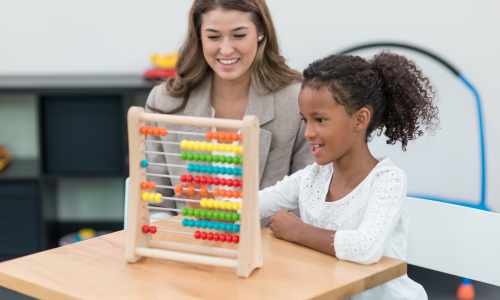The core purpose of Occupational Therapy for Children is to empower and enable children, young people, and their families to live their lives as independently and easily as possible.
Occupational Therapists believe that taking part in everyday activities (or “occupations”) improves wellbeing and enables people to live safe, happy, and healthy lives. Occupational Therapy uses a holistic and family centred approach, considering the aspects of the person, their occupations and environment. Adapting aspects in any of these areas can improve participation and wellbeing.
Occupations for children or young people include:
- Self-Care: Learning to wash, dress, eat & toilet independently
- Play and Leisure: It is through play that children learn and practice new skills, make friends, and find a sense of self.
- Education: Participation in education is a key occupation for children and young people.
Further information on Occupational therapy and children and young people
All referrals are triaged by a senior therapist to indicate best pathway suitable for your child’s needs and prioritised based on clinical risk*.
Our current service provides a graduated approach:
- Universal Approach
- Targeted Approach
- Direct Therapy
This approach is available to all. Universal Offer focuses on educating parents/carers/educational setting around strategies that will help ensure:
- To enable carers to develop their understanding of the child’s needs
- Advice is practiced within the ‘real’ environment of the child and young person and
- Also, that the advice and strategies are integrated into their daily routines
This is designed for children and young people with identifiable need who may benefit from a consultation or targeted screening from a qualified therapist.
Families may be signposted back to educational workshops or supported via targeted advice to be embedded into daily activities.
This is provided for children and young people with known and significant needs and impact on their participation in daily life.
The services include:
- One to One Assessment including some standardised tests
- Specialist Equipment Assessment including specialist seating and moving and handling equipment
- Environmental Assessment – Home and School
- Specialist Treatment approach as indicated from assessments (which can be one to one or in a group setting)
- Upper limb Assessment & Splinting
- Motor Coordination Difficulties completed as Joint Assessment with Physiotherapy team.
- Functional difficulties such as dressing, eating
- School skills such as pencil and scissor skills
Eligibility criteria
Children and Young People who are eligible to be referred for an Occupational Therapy assessment are those:
- Present with functional difficulties which affect their development, performance and independence in daily activities relating to self-care, home/school, play/leisure activities
- Present with difficulties accessing home and school environments and/or facilities within those environments which may require an assessment for equipment or adaptations.
Exclusion criteria
- Children with significant self-injurious behaviours relating to anxiety and sensory processing difficulties.
- Children requiring behavioural management approach
- Overcrowding at home
- Leg splints/AFO’s
- Helmets
- Car seats and harnesses
- Difficulties only related to educational achievement
- Specialist Sensory Integration TM assessment
- Please see SIN and RCOT
- Specialist pushchairs or wheelchair -please contact Warwickshire Wheelchair Services (add hyperlink to W/C services)
SEND reforms & Local offer
View Warwickshire’s Local offer for children with SEND
SEND legislation requires health service providers to work with Local Authorities to publish a “Local Offer” for children and young people with Special Educational Needs/Disabilities (SEND), aged 0-25.
The local offer provides information on what services children, young people and their families can expect from a range of local agencies including education, health, and social care. Knowing what is out there provides more choice and control over what support is right for each individual child and young person.
This information is also valuable in helping service providers to signpost parents, carers, children and young people to the appropriate support.
SWFT Children’s OT website outlines our contribution to Warwickshire’s SEND local offer.
Occupational Therapy Pathways - Coming Soon!
Referrals to our services can be made by Parents, Schools, GP's, Paediatrician and any other health and social care professionals
Please complete the form below with as much detail as possible regarding the child, their challenges, and needs. Please ensure you have provided all details and contacts of any involved professionals working with the child and obtained consent from family. For more information see 'What our service offers' or download our service leaflet.
What happens next?
Referrals will be triaged and accepted if the referral criteria has been met. For more information see 'What our service offers' or download our service leaflet.
To complete an online referral
Do you live in North Warwickshire or Rugby Area?
Scan this QR code
Do you live in South Warwickshire Area?
Scan this OR Code
Alternatively, download the Occupational Therapy referral form to complete and post it our address on the form.
We are based in 3 areas of Warwickshire:
Children & Young People Occupational Therapy
Bulkington Village Community Centre, School Road Bulkington, Bedworth, CV12 9JB
Tel: 02475 189195
Children & Young People Occupational Therapy
The Orchard Centre, Lower Hillmorton Road, Rugby, Warwickshire, CV21 3SR
Children & Young People Occupational Therapy
Building three, Saltisford Office Park, Ansell Way, Warwick, CV34 4UL
Tel: 01926 567122
We believe in early identification and support within the community.
This is in-line with the best practise evidence that suggests educating and up-skilling those working in closest proximity to the child/young person.
Please follow the steps below to help your child at home:
- Choose the area of difficulty that you and/or your child’s teacher think they have most difficulty with and work mainly on that area first.
- Decide what is a priority for your child and try to tackle this first.
- To prioritise, think about which difficulty is having the greatest impact on a day to day basis.
- Set small and manageable targets, using the goal setting template to help you.
- Download the outcome form.
- Practise activities as per the advice sheets from the resource finder.
- Complete Monitoring form here for your and professionals record.
- Please read the guide to help you understand how to get the best from this resource.
What appears to be difficult?
Please click on the relevant concern below and download the handouts.
What appears to be difficult?
Please click on the relevant concern below and download the handouts.
- My child can’t sit upright at their desk or on their chair
- Video on Handwriting prep
- I don’t think my child holds their pen correctly
- Video on Handwriting
- My child complains of discomfort or ‘tired hands
- Video on Hand strengthening
- My child has difficulty 'forming' or 'spacing' their letters (e.g. they write letters backwards or too close together)
- Video on Prewriting skills
What appears to be difficult?
Please click on the relevant concern below and download the handouts.
What appears to be difficult?
Please click on the relevant concern below and download the handouts.
- My child is a 'fussy eater
- My child can't use a knife and fork
- My child complains of discomfort or 'tired hands'
- Video on Hand Strengthening
- My child can't sit upright to eat a meal
- Video on Posture Preparation
- My child can't sit still long enough to eat a meal
- My child has difficulty chewing and swallowing
What appears to be difficult?
Please click on the relevant concern below and download the handouts.
- My child has difficulty balancing (e.g. standing on one leg) and appears 'clumsy' or un-coordinated.
- My child fatigues quickly, they often prop on the table or slump in a chair.
- Video on Posture Preparation.
- My child appears to have poor spatial awareness and bumps into things.
- My child appears to be clumsy
- My child struggles to plan how to move their body or use it effectively (they may struggle to learn new tasks such as bike riding or climbing on park equipment).
What appears to be difficult?
Please click on the relevant concern below and download the handouts.
What appears to be difficult?
Please click on the relevant concern below and download the handouts.
What appears to be difficult?
Please click on the relevant concern below and download the handouts.
- My child can't tell the difference between similar letters i.e. p & d
- My child finds it difficult to notice similarities and differences between objects and words
- My child can't tell what a shape is if it is partly hidden
- My child finds it hard to recognise a word if they can't see all of the letters
- My child has difficulty spacing letters/words
- My child can't stay on the line when writing
- My child can't copy patterns/shapes
- My child struggles with target games
- My child has to think hard about a letter before writing it
- It takes my child a long time to copy from the board at school
- My child struggles to remember maths equations, lines in a play etc
- My child puts clothes on the wrong way/shoes on wrong feet
- My child wouldn't recognise a word, letter or shape if it was turned around or upside down
- My child finds it hard to find things in a bag, tray, pencil case, drawers etc
- My child easily loses their place/page when reading
- My child finds it hard to read off the board when there is lots of writing
What appears to be difficult?
Please click on the relevant concern below and download the handouts.
- My child's sensory needs are impacting upon school participation
- My child is struggling to sleep
- My child seeks movement, to the extent it interferes with daily activities
- My child finds 'touch' distressing
- My child appears 'clumsy'
- My child has difficulty accessing busy places e.g. supermarkets or birthday parties
How to help the child at School?
Children’s Occupational Therapy has designed 6 programmes to choose from, arranged in a developmental sequence.
Starting with foundation skills in movement and body awareness, moving on to more complex fine motor and pre-writing skills, all the way up to handwriting fluency.
Each programme is designed to run for a half term (6 weeks), with 3 short sessions (approximately 20-30 minutes) per week.
The programmes are ideal for a small group setting and the booklets contain all the information you need to deliver the programmes, with a session-by-session plan.
A simple checklist helps you decide which programme would be most suitable for each child, and there are accompanying baseline and outcome measures, and a form for recording each session.
How to use the programme
- Complete the 'Which Programme' table to identify which interventions to use
- Complete the Baseline assessment at the beginning of the intervention
- Record all sessions completed
- Fill in the Outcome assessment at the end to see if they have improved
- If no improvement, repeat the programme
- If they have improved, move on to the next programme.
Checklist to trial strategies and equipment to try in Classroom.
Use this to identify classroom strategies you can try to common difficulties.
Which programme? Checklist
Use this to help decide which programme to use with each child.
Based on the outcome of the 'Which Programme? Checklist
Download the relevant Baseline and Outcome Assessment Form below.
Complete this before starting the intervention and at the end of the intervention.
- Foundation Skills baseline and outcome assessment
- Hand Skills baseline and outcome assessment
- Skilled Hand Use baseline and outcome assessment
- Visual Perception baseline and outcome assessment
- Handwriting - Letter Formation baseline and outcome assessment
- Handwriting - Fluency and Speed baseline and outcome assessment
Download Intervention Programmes below:
- Intervention Programme 1: Foundation Skills
- Intervention Programme 2: Hand Skills
- Intervention Programme 3: Skilled Hand Use
- Intervention Programme 4: Visual Perception
- Intervention Programme: 5: Handwriting - Letter Formation
- Intervention Programme: 6: Handwriting - Fluency and Speed
Download the Session completion record
Use this document to record which sessions have been completed and any important progress/ difficulties.
Complete the 'After Intervention' column in the Baseline and Outcome Assessment form filled at the start of the intervention.
See above for the links to download.
Does your child present with fine and gross motor coordination difficulties?
Children’s Occupational Therapy Team and Physiotherapy Team have developed this pathway to support children with difficulties related to fine and gross motor coordination skills.
Prior to a referral into this pathway, we require you to complete the following programmes within the educational setting and can be supported by home.
- MOVES Gross Motor Programme South Warwickshire University NHS Foundation Trust :: MOVES programme for schools
AND
- Children’s Occupational Therapy Programmes :: How can I help the child at school?
Following completion of the programmes, if the child continues to have motor skills deficit that interferes with their ability to complete everyday activities (such as self-care) appropriate to their developmental age and impacts academic/school productivity, prevocational and vocational activities, leisure and play, please refer them to our Motor Coordination Clinic.
How to refer for Motor Coordination Clinic
- Email proof of completion of the MOVES programme and the OT fine motor programme to motorcoordinationclinic
@swft.nhs.uk . - Complete Parental Questionnaire or scan this QR code for the Parental Questionnaire.
- Complete the Referral Form or scan QR code.
Please note, the referral will not be accepted without the above documents via email and a completed parent questionnaire.
On receipt of the information and referral form, this will be reviewed to assess if the child requires an assessment within the motor coordination clinic for problem such as Developmental Co-ordination Disorder, or if their needs are best met by our services individually.
We all rely on sensory information to function and participate in everyday activities. Most of us instinctively respond to the challenges in daily life, our brain and nervous system (senses) help us to respond quickly, and appropriately to keep our selves safe and comfortable.
But we do not all experience sensation in the same way. Some will demonstrate strong sensory preferences, seeking a sensation as it is pleasing and satisfying whilst others may avoid activities as the sensory experience overwhelms.
Our universal digital sensory workshop has been developed to support parents, carers and education staff to develop their understanding of the sensory systems. Participants will be able to explore strategies which will enable a more responsive approach to meeting a child’s sensory needs.
The workshop can be accessed digitally via the South Warwickshire University Foundation NHS Trust SWFT youtube page. Login details will be forwarded in response to an appropriate child specific request, these can be submitted digitally via NorthChildrensOT
On completion of the universal digital sensory workshop attendees are encouraged to use the sensory toolkit. The toolkit will support you to identify sensory triggers so you can select appropriate strategies for use when needed. These strategies will need to be use consistently for a number of weeks; we recommend a minimum of 12 weeks.
Please complete the Sensory Checklist and use the Sensory Toolkit to guide you.
For additional resources please see
Please complete the Sensory Record to ensure that you have a clear record of the strategies that are effective for your child and those which have not delivered the desired outcomes to support your child’s needs.
Your views and feedback continue to help shape the services we deliver on completion of the digital workshop, please follow the link for our feedback questionnaire.
Sensory Assessments
South Warwickshire University Foundation NHS Trusts Childrens Occupational Therapy (physical disability) Team offer a need led provision; referrals must meet the referral threshold criteria.
Occupational Therapists may use sensory theory to form part of a functional assessment. We do not screen for sensory needs or deficits where there are no known functional participation difficulties.
We acknowledge the diverse nature of needs; some requests will extend beyond the scope of the SWFT Childrens Occupational Therapy Service.
Local mental health support is provided for children and young people via Coventry & Warwickshire Rise. The Primary Mental health team deliver Free Parent information Sessions to support understanding in relation to anxiety related needs, emotional regulation, self-harm and mood.
If your child has a confirmed learning disability you may like to seek behavioural support from the CAMHS Learning Disabilities Team.
Who can be referred?
- Children aged 0-18, or 19 if they attend a specialist education setting or are eligible for child benefit.
- Children in permanent residence within Warwickshire and/or registered with a Warwickshire General Practitioner (GP)
- Children whose Parents/Carers pay council tax to Warwickshire where main reason for referral relates to home adaptations and/or equipment.
- Children not resident within Warwickshire but attending a Warwickshire School where main reason for referral relates to difficulties accessing the curriculum or school environment.
- Children that present with functional difficulties which affect their development, performance and independence in daily activities relating to self-care, home/school, play/leisure activities
- Present with difficulties accessing home and school environments and/or facilities within those environments which may require an assessment for equipment or adaptations.
Who can refer?
- Parents
- GPs
- Consultants and Community Paediatrician
- Healthcare professional
- Schools
- Psychology services
- Other health, education or social care professionals
How do I refer?
Referral forms can be downloaded from the 'Making a referral' tab.
What difficulties do you provide help with?
Assessment will be tailored to identify your child's difficulties which may include:
- Functional difficulties such as dressing, eating, toileting
- Sensory Processing Difficulties impacting on function
- Environmental adaptations.
- School skills such as pencil and scissor skills
- Play skills
- Fine motor skills and gross motor function
- Upper limb assessment & splinting
- Equipment needs, including specialist seating and moving and handling equipment
What can’t you help with?
- Overcrowding at home
- Leg splints/AFO’s
- Helmets
- Car seats and harnesses
- Difficulties only related to educational achievement
- Emotional or behavioural difficulties relating to Mental Health and emotional needs
- Specialist Sensory IntegrationTM assessment
- Please see SIN and RCOT
- Specialist pushchairs or wheelchair -please contact Warwickshire Wheelchair Services
What treatment interventions & support may children, young people and families get?
We use a holistic approach to treatment interventions, involving the child/young person, their families and other health, social care and education professionals who are involved in their care.
Depending on your child’s assessed needs, treatment intervention & support may include:
- Inviting Parents and/or school staff to attend one of our workshops
- Providing individualised therapy programmes and working with parents and school staff to implement these in the child’s school and home settings
- Assessment and recommendation of specialist equipment to support functional skills, learning and play
- Involvement in educational and transition planning
- Signposting and/or referring to other relevant services
- Collaborative working with other health, education and social care professionals as part of a Multi-Disciplinary Team.
How long will my child have to wait?
Whilst we aim to see every child in a timely manner, we do have a waiting list. If your child’s referral meets our service criteria, they will be placed on a waiting list to be seen or allocated to an Occupational Therapist and is determined by level of risk.
Where might my child be assessed?
Where the initial assessment takes place is determined by what difficulties are identified in their referral. The initial assessment may take place through a telephone assessment. If Face to Face assessment is indicated, the most appropriate setting for the assessment to take place will be offered. This may be within a clinic, nursery/school, and/or the child’s home.
If further Occupational Therapy is required, the Occupational Therapist will talk with you about the best place to see your child.
How many times will my child be seen by an OT?
This will vary depending on their needs. Some children have mild difficulties whilst other children may have longer term needs.
Children are discharged from our service when the Therapist feels confident that the child is developing skills in line with his/her general development, and that the recommended strategies to support his/her needs have been shared with family and education setting.
The Therapist will discuss the discharge process with parents and support staff and explain how they can access support in the future if this is needed.
How will Occupational Therapy benefit my child?
There are numerous benefits of Occupational Therapy for children, these include:
- Greater independence and/or safety when carrying out daily tasks
- Increased likelihood they will reach their full potential
- Less frustration when completing day-to-day occupations i.e. eating, dressing, playing, schoolwork
- Increased self-esteem, confidence and participation in activities
- Improved social relationships
- Reduced anxiety for child and/or parents
- Better understanding and awareness of functional difficulties within the home and/or school environments, resulting in improved learning
What happens if my child misses or cannot attend an appointment?
There are many children who are waiting to be seen by Occupational Therapy, so it is very important that we make the best use of the appointments we have available.
If your child cannot attend their appointment, we urge you to ring the office number on the appointment letter or on this website to cancel and rearrange the appointment. If your child is not brought without contact us to cancel the appointment, your child may be discharged.
Why has my child been discharged?
Your child will be discharged when they no longer need our service. Reasons for discharge include:
- Their agreed goals have been achieved
- Occupational Therapy will no longer impact on future skill progression
- Those involved with the child have the knowledge and skills to carry out strategies and support the child’s occupations
- The child is not able to engage with Therapy
- The child is being transferred to a specialist and/or other service(s)
- The child has not been brought to appointments
- The child has moved out of Warwickshire
Children can be re-referred in the future should their needs change or new difficulties arise.
My child is transitioning into adulthood, what support will they get?
As your child approaches 18 (or 19 if they attend a education setting), we will support them by planning their transition into adulthood by ensuring that referrals to relevant adult services are made in advance.
My child has been referred for an Education, Health and Care Plan (EHCP) needs assessment, will they be assessed by an OT?
If your child has previously been assessed by children’s occupational therapy service, the therapist will contribute from clinical records or a further assessment may be arranged.
If your child has never been known to the occupational therapy service, a request for an assessment will be screened and prioritised as per our clinical criteria. See what our service offers (link).
English is not my first language; Can I have an interpreter?
If English is not your first language and you think that you may not be able to communicate well with our staff, please let us know as soon as possible so we can arrange a professional interpreter to be present at your child’s appointment(s).
The person making the referral to our service can also request an interpreter when completing our referral form.
South Warwickshire NHS Foundation Trust is committed to supporting and developing the future healthcare workforce across all disciplines. Our Trust covers the whole of Warwickshire for children and young people who require access to the Occupational Therapy Service.
Within the Children’s Occupational Therapy team, we consistently support students and learners, primarily from Coventry University on their clinical placements. Our placements offer a wide range of clinical experiences and we work with children and their families within clinics, hospitals, homes, early years settings, mainstream schools and special schools.
Occupational Therapy students are given the opportunity to work closely with parents, teachers, education support agencies and other health professionals. Students are supported by a placement co-ordinator and a named educator as well as the wider team who have a high level of training and experience across a range of medical conditions and age groups. Opportunities to reflect on and discuss all clinical and non-clinical experiences are embedded into our clinical placements.
We maintain a close relationship with the universities we work with to ensure that we offer a high quality, positive learning experiences for all learners.
We have an Allied Health Professions (AHP) Student Lead within the Pre-Graduate Education Team who supports the AHP Teams and students across the Trust with learning, development and education.
There are a number of routes into a career in Occupational Therapy including Undergraduate degree (BSc), Postgraduate degree (MSc) and Apprenticeships. To find out more please click on the links below.
There are also Support Worker and Assistant roles across Occupational Therapy teams. Find out more about these roles.
We will also consider supporting students from out of region Universities whose permanent home address is within Warwickshire. Please contact our Learning & Development Team on Learning.
Childrens Occupational Therapy, did you get great care?
Please help us improve our patient care by completing the ‘I want great care’ feedback form.
Scan this QR Code:
Or open the feedback form online and enter the code 3636
We look forward to hearing from you.
Thank you for your time
- Millbrook Healthcare – Please contact Millbrook on 0333 321 8986 for urgent equipment repairs or to arrange servicing of the equipment.
- Royal College of Occupational Therapists
- Health and Care Professions Council
- Warwickshire SEND
- Warwickshire Integrated Disabilities Service (IDS)
- Warwickshire Family Information Service
- The OT Toolbox
- Council for Disabled children
- Coventry and Warwickshire Rise
- Sensory Integration Network
- National Autistic Society
- Cerebra
- Canchild
- Dyspraxia Foundation
- Wheelchair services – webpage link for Warwickshire wheelchair services







